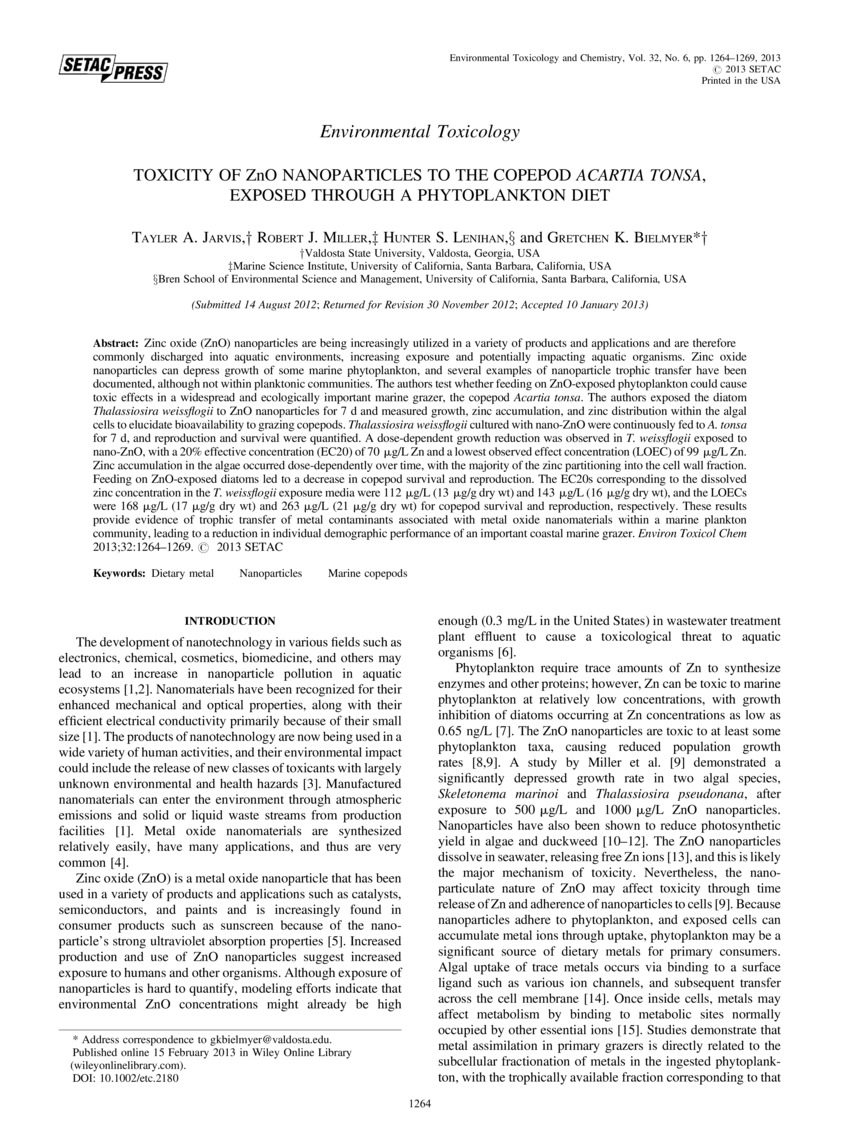Journal Article
AccessToxicity of ZnO Nanoparticles to the Copepod Acartia tonsa, Exposed Through a Phytoplankton Diet
Zinc oxide (ZnO) nanoparticles are being increasingly utilized in a variety of products and applications and are therefore commonly discharged into aquatic environments, increasing exposure and potentially impacting aquatic organisms. Zinc oxide nanoparticles can depress growth of some marine phytoplankton, and several examples of nanoparticle trophic transfer have been documented, although not within planktonic communities. The authors test whether feeding on ZnO-exposed phytoplankton could cause toxic effects in a widespread and ecologically important marine grazer, the copepod Acartia tonsa. The authors exposed the diatom Thalassiosira weissflogii to ZnO nanoparticles for 7 d and measured growth, zinc accumulation, and zinc distribution within the algal cells to elucidate bioavailability to grazing copepods. Thalassiosira weissflogii cultured with nano-ZnO were continuously fed to A. tonsa for 7 d, and reproduction and survival were quantified. A dose-dependent growth reduction was observed in T. weissflogii exposed to nano-ZnO, with a 20% effective concentration (EC20) of 70 µg/L Zn and a lowest observed effect concentration (LOEC) of 99 µg/L Zn. Zinc accumulation in the algae occurred dose-dependently over time, with the majority of the zinc partitioning into the cell wall fraction. Feeding on ZnO-exposed diatoms led to a decrease in copepod survival and reproduction. The EC20s corresponding to the dissolved zinc concentration in the T. weissflogii exposure media were 112 µg/L (13 µg/g dry wt) and 143 µg/L (16 µg/g dry wt), and the LOECs were 168 µg/L (17 µg/g dry wt) and 263 µg/L (21 µg/g dry wt) for copepod survival and reproduction, respectively. These results provide evidence of trophic transfer of metal contaminants associated with metal oxide nanomaterials within a marine plankton community, leading to a reduction in individual demographic performance of an important coastal marine grazer.
Publisher - Wiley Interscience
Subjects - Crustacean, Copepod, Acartia Tonsa; Chemical, Zinc; Nanoparticles
Citation: Jarvis TA, Miller RJ, Lenihan HS, Bielmyer GK. 2013. Toxicity of ZnO Nanoparticles to the Copepod Acartia tonsa, Exposed Through a Phytoplankton Diet. Environ. Toxicol. Chem.; 32(6):1264-1269 http://dx.doi.org/10.1002/etc.2180
